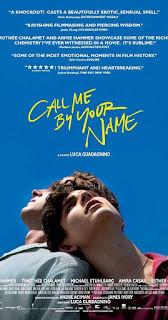It's unfortunately not too rare a thing for a mostly good movie to have a weak ending. I feel like I've adjusted to that, and generally know how to process a move that stumbles at the finish line. (It generally works out like gymnastics scoring; you give a deduction for not sticking the landing, depending on how much it undermines what came before.) I'm having a much harder time sussing out my thoughts on a new movie that does the opposite, delivering 15 minutes of concentrated amazing right at the end, after a boring snooze of a story.
Call Me By Your Name is in the Oscar mix this year, said to be a likely Best Picture contender and certain to get a Best Actor nomination for its star Timothée Chalamet. Set in the Italian countryside in 1983, it's the story of Elio, the 17-year-old son of an archaeology professor. He's been brought to Italy for the summer as his father works, but he doesn't have much to do with his days but read and flirt. (Hard life.) When a graduate student named Oliver arrives to support his father's work, Elio is awash in confusing feelings. But over the next few weeks, things become much more clear -- he's utterly smitten with the man.
I think it's hard to know whether this is a movie that would be in the Oscar mix on its own merits were it not for the fact that Moonlight took home the Best Picture statue last year. It is nice that stories with LGBT protagonists can actually get noticed and appreciated now; I just wish this one weren't so relentlessly boring. Moonlight at least was narratively interesting in its three-act construction, and had a reasonable sense of stakes -- of risk -- because of the life its main character had built for himself.
Call Me By Your Name feels about as low stakes as you can get. Brought to Italy from America, Elio is quite free to explore whatever he wants in relative isolation; few consequences are likely to follow him home. His parents (particularly his father) are so consumed by their own day-to-day routines, it feels like he's free to do whatever he wants and they're never going to find out -- what they might think of his coming out to them (as gay or bisexual; the movie leaves some ambiguity on this) hardly seems like a concern either.
The movie's pace is as lacking as the stakes. I'd say it's a "slow burn" getting to the blossoming of the relationship between Elio and Oliver, but that would imply there was any sense of "burn" to it at all. The passion seems wholly absent for well over an hour, as the camera seems more in love with the scenery than in the prospective couple. To be fair, this movie makes Italy look gorgeous, but I don't think scenes need to linger on for 10-15 seconds extra just to pan over a vista.
Even once the relationship begins, there aren't many sparks in it for
another long stretch -- partly due to the script and partly due to the
casting of Armie Hammer as love interest Oliver. Hammer is charismatic,
for sure, but he looks like he's in his 30s (though his character is
meant to be in his early 20s); pairing him with Timothée Chalamet (who
is in his early 20s, but looks like the 17 his character is supposed to
be) makes for an uncomfortable age gap.
What passes for plot in this story is so thin that it has to be doubled up. The movie serves up two or even three scenes with exactly the same narrative purpose, again and again. It's as though the writer believes that this movie is being so subtle, so subtextual, that he thinks the repetition might be needed just to make sure the audience gets it. He needn't have worried; we do. So little is going on that you're force to mine every tilt of a head for whatever meaning it might carry. It's work to stay engaged.
Put simply, the first hour and 55 minutes or so of this two hour and 10 minute movie are borderline terrible.
But then there's that last 15 minutes.
Call Me By Your Name concludes with a run of four scenes that all pack a stunning emotional wallop. First, there's a moment in which Elio's facade crumbles completely; you realize you only think his mask has dropped before this. Then comes what might just be the single best scene in any movie all year, between Elio and his father, where actor Michael Stuhlbarg absolutely crushes a moving monologue. Next comes an epilogue in which the recently exposed emotions of both the audience and Elio are buffeted again. Finally, as the end credits play, the camera lingers on Timothée Chalamet's face in an unbroken close-up that lasts several minutes and is a silent and powerful journey all unto itself.
Ratio-wise, we're barely talking about 10% of the movie. But pound for pound, it's the most brilliantly executed four scenes I've watched in quite a while. It's amazing, perhaps even more so for suddenly wringing a reaction from the audience after numbing it so thoroughly by what came before.
I've really wrestled with how to rate this movie, and I'm not even sure I've reached a real conclusion. But for the purposes of this post, I think I'm going to call the movie a B- overall. I'm not sure I can really recommend it; I'm not sure the juice is worth the squeeze, as they say. But I also think that all considered, I'm glad I did see it.

No comments:
Post a Comment